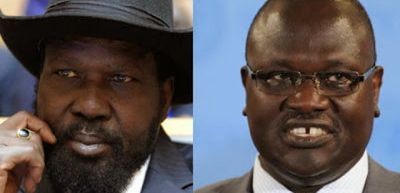Police and soldiers loyal to President Salva Kiir rounded up between 200 and 300 Nuer men and forced them into an overcrowded room in a government building of Gudele neighborhood in Juba on 16 December, where they were then massacred, the organization Human Rights Watch concluded in a recent report.
According to HRW it is the worst single incident of targeted attacks allegedly perpetrated by Dinka members of South Sudan’s armed forces and security services against Nuer males, including civilians.
The documentation collected by the rights group corroborates earlier reports as to the scale of the bloodshed, including witness accounts of trucks filled with bodies moving through Juba streets to an unknown location.
General Pieng Deng Kuol, inspector-general of South Sudan’s police service, has established a five-member committee to investigate killings of civilians in Juba including the Gudele incident. Similarly, James Hoth Mai, chief of staff of the army, ordered the arrest and investigation of soldiers suspected of killing “innocent soldiers and civilians simply because they hail from different tribes.”
Human Rights Watch based its report on more than 200 interviews with victims and eyewitnesses. It stated that during the night of 15 December and the following day, “soldiers and policemen from around the Gudele and other nearby neighborhoods gathered hundreds of Nuer men… and detained them in a building used by the police, near the junction that divides Juba’s Gudele 1 and Gudele 2 neighborhoods.”
Between 200 and 300 people were jammed into the room. It was so crowded and hot that several men collapsed during the day on 16 December.
Systematic execution
“At around 8 p.m., gunmen alleged to be government forces began systematically shooting into the room through windows on one side of the building, killing almost all of the people in the room, a few survivors said,” the report states.
HRW quoted one survivor as saying, “The windows were opened and then they shot through them. It was just light from the guns and the sound of the shooting. They shot me in the inner thigh, I fell and then dead people fell on top of me.”
About an hour later, armed men with torches entered the room and shot again several times at people, apparently anyone who appeared to have survived, leaving the door open after they left, HRW reported.
At least two survivors escaped during the night. The following afternoon, members of South Sudan’s National Security Service freed 11 others who had been protected when bodies fell on them and who had spent the day with the corpses. Several of the survivors had severe gunshot wounds.
“I thought I would go mad … for three days I could hear the screaming and the shooting in my head,” said one man who had been hiding near the site of the massacre. “I knew my brother was captured in there.”
Human Rights Watch talked to neighbors of various ethnicities who described with great distress the huge number of bodies they saw at the site on 17 December and their removal in large trucks on 18 December.
Crimes by both parties
Crimes have been committed also by opposition forces, according to the rights group, including the killing of civilians in Jonglei, where armed youth accompanied by uniformed security forces loyal to ousted vice president Riek Machar on 19 December attacked a UN base in the town of Akobo.
Around 30 Dinka including disarmed soldiers and civilians had taken shelter there, witnesses said. In a stampede on the base during the attack, two peacekeepers and an estimated 20 civilians and disarmed soldiers were killed.
Elsewhere, two Dinka staff at a base owned by the Greater Nile Petroleum Operating Company oil consortium described to Human Rights Watch how Nuer day laborers turned on Dinka staff and killed at least six men using batons and machetes on the night of 16 December. Both witnesses said Nuer police on the base saw the violence and did not intervene.
Human Rights Watch was not able to conduct an on-site investigation in the town of Bor, the capital of Jonglei that is still under control of general Peter Gadet who is loyal to Machar. Interviews with people who fled from Bor to Awerial, describe clashes between government and defecting anti-government security forces, indiscriminate attacks on civilians in densely populated areas, targeted shootings and attacks on civilians, and widespread looting and destruction in Bor.
The civilian death toll is unclear, but many witnesses who had returned to Bor in late December said the streets were littered with dead bodies. Human Rights Watch viewed footage obtained by a local government official showing 28 dead bodies in various locations, including close to the UN base, and many witnesses interviewed in Awerial said relatives or neighbors were among the dead.
Gadet’s forces, augmented by thousands of armed Nuer, retook Bor on 31 December, 2013. Civilians received warnings of the approaching forces and fled into the bush and marsh areas surrounding the town, in some cases leaving behind elderly or ill relatives who could not run.
“Those unable to run (from the rebels) were burned in their houses, including two elderly men, Achieng Mayen and Kuol Garang, and a paralyzed woman, Yanadet Garang,” a chief from an area just outside Bor told Human Rights Watch.
Related: Truckloads of bodies removed from Juba military hospital (18 Dec.)




